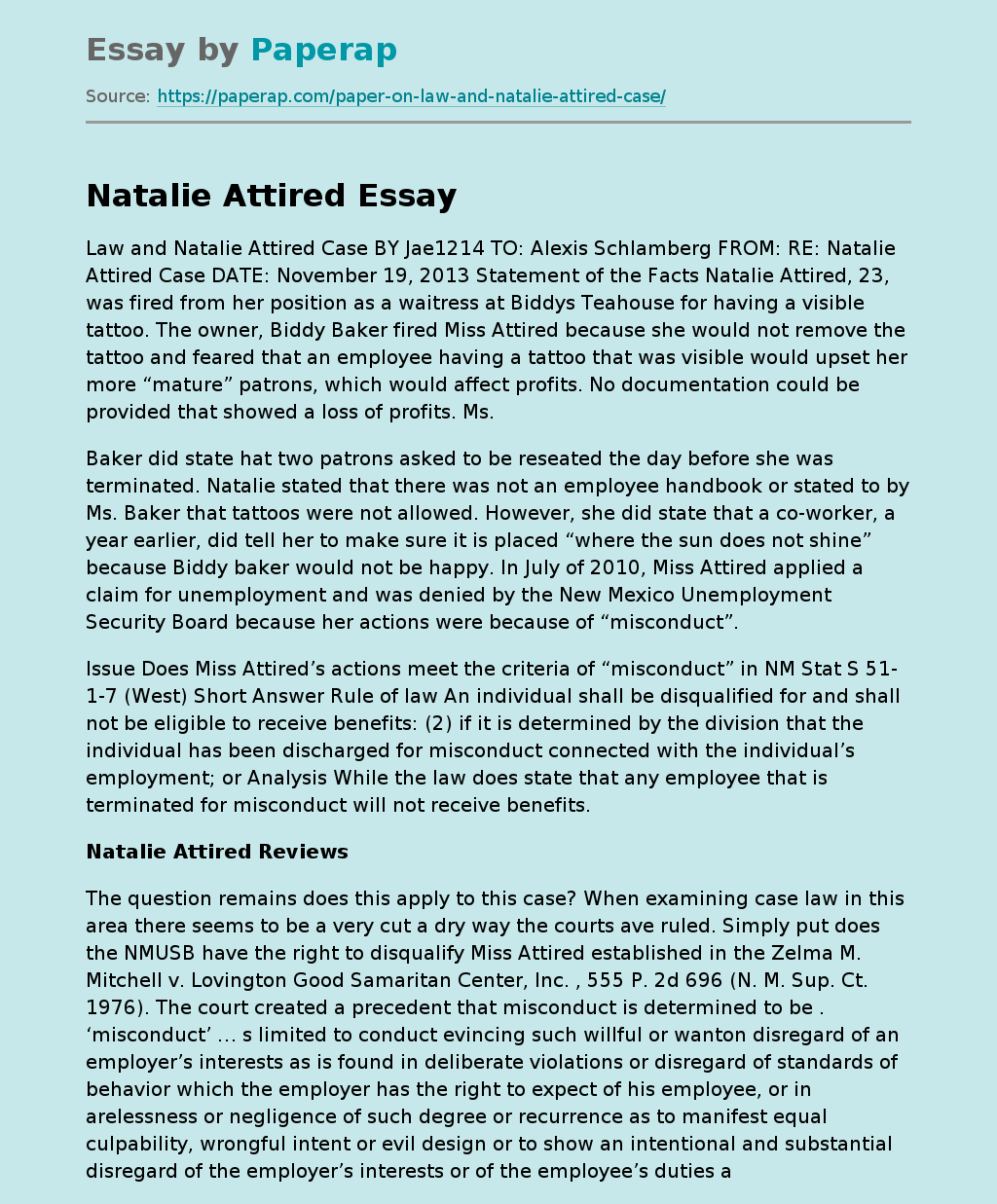Natalie Attired
Law and Natalie Attired Case BY Jae1214 TO: Alexis Schlamberg FROM: RE: Natalie Attired Case DATE: November 19, 2013 Statement of the Facts Natalie Attired, 23, was fired from her position as a waitress at Biddys Teahouse for having a visible tattoo. The owner, Biddy Baker fired Miss Attired because she would not remove the tattoo and feared that an employee having a tattoo that was visible would upset her more “mature” patrons, which would affect profits. No documentation could be provided that showed a loss of profits.
Ms.
Baker did state hat two patrons asked to be reseated the day before she was terminated. Natalie stated that there was not an employee handbook or stated to by Ms. Baker that tattoos were not allowed. However, she did state that a co-worker, a year earlier, did tell her to make sure it is placed “where the sun does not shine” because Biddy baker would not be happy. In July of 2010, Miss Attired applied a claim for unemployment and was denied by the New Mexico Unemployment Security Board because her actions were because of “misconduct”.
Issue Does Miss Attired’s actions meet the criteria of “misconduct” in NM Stat S 51-1-7 (West) Short Answer Rule of law An individual shall be disqualified for and shall not be eligible to receive benefits: (2) if it is determined by the division that the individual has been discharged for misconduct connected with the individual’s employment; or Analysis While the law does state that any employee that is terminated for misconduct will not receive benefits.
Natalie Attired Reviews
The question remains does this apply to this case? When examining case law in this area there seems to be a very cut a dry way the courts ave ruled. Simply put does the NMUSB have the right to disqualify Miss Attired established in the Zelma M. Mitchell v. Lovington Good Samaritan Center, Inc. , 555 P. 2d 696 (N. M. Sup. Ct. 1976). The court created a precedent that misconduct is determined to be . ‘misconduct’ … s limited to conduct evincing such willful or wanton disregard of an employer’s interests as is found in deliberate violations or disregard of standards of behavior which the employer has the right to expect of his employee, or in arelessness or negligence of such degree or recurrence as to manifest equal culpability, wrongful intent or evil design or to show an intentional and substantial disregard of the employer’s interests or of the employee’s duties and obligations to his employer.
On the other hand mere inefficiency, unsatisfactory conduct, failure in good performance as the result of inability or incapacity, inadvertencies or ordinary negligence in isolated instances, or good faith errors in Judgment or discretion are not to be deemed ‘misconduct’ within the meaning of the statute.
When reading what the court deemed to be misconduct the question remains does the tattoo that Miss Attired bought and would not remove mean she was intently going against her employers wishes if there is no written rule or employee handbook to follow and does evidence need to be supported that there will be a loss of business as Ms. Biddy is claiming there will be. When examining and case of It’s Burger Time, Inc v. New Mexico Department of Labor Employment Security Department, Board of Review et. al, 769 P. 2d 88 (N. M. Sup. Ct. 989), the courts have stablished that evidence must be shown that a loss of business is in direct correlation to the act deemed as misconduct. Conclusion Miss Attired’s case will be overturned based on the criteria that misconduct cannot be established as willful or wanton disregard of the employer’s wishes because there was not an employee handbook. Other evidence that will be considered and supported is that the employer could not show a loss of business or patrons to her establishment and therefore the tattoo had no affect on her business which does not support being misconduct.
Natalie Attired. (2019, Dec 05). Retrieved from https://paperap.com/paper-on-law-and-natalie-attired-case/

